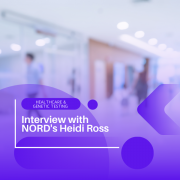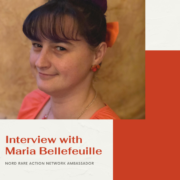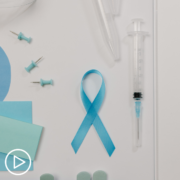Healthcare and Genetic Testing
Leading up to the NORD’s Rare Diseases and Orphan Products Breakthrough Summit on October 18 – 19, we interviewed NORD’s Director of Policy, Heidi Ross.
Please tell us about yourself and your work at NORD
My name is Heidi Ross, and I am the Director of Policy at the National Organization for Rare Disorders (NORD). My job at NORD involves working at the state and federal level to ensure laws are in place so patients have access to affordable, quality health care coverage, including necessary health care providers, diagnostics, and treatments. I love getting to work with policy makers and advocates to ensure our health care system is meeting the needs of rare disease patients.
What is genetic testing and how does it impact people with a rare disease?
According to the National Institutes of Health (NIH), there are an estimated 7,000 rare diseases and 2/3 of rare diseases are thought to be directly caused by changes in genes or chromosomes. Additionally, it takes on average 5-7 years for rare disease patients to get an accurate diagnosis. There are a lot of different types of genetic tests. Some tests only look for variations in one gene, but other genetic tests are more complex and can look at the entire genome for changes. For some rare disease patients genetic testing can be a useful tool for obtaining an accurate diagnosis and can assist health care providers in determining an appropriate treatment plan.
How can someone with a rare disease access genetic testing?
Patients should consult with their health care provider to determine if genetic testing would be helpful in the diagnosis of their condition.
How is genetic testing impacting health care costs for people with a rare disease?
The costs associated with genetic testing vary significantly, as does the out-of-pocket expenses for patients, depending on the type of genetic testing being conducted and the type of health care program or insurance a patient utilizes. However, the costs associated with a long diagnostic odyssey can also be significant for patients and the broader health care system, as patients suffer though unnecessary or unhelpful tests, treatments, or hospitalizations. The uncertainty can also take a significant toll on the mental health of patients and their loved ones.
Can you tell us more about the Healthcare System Savings with Genetic Testing breakout session?
This break out session is focused on Project Baby Bear, which was a $2 million pilot project to provide rapid whole genome testing to ill newborns eligible for care under California’s Medicaid program, Medi-Cal. We have an amazing panel, including the state legislator, Assemblyman Brian Maienschein, who championed the creation of Project Baby Bear, Dr. David Dimmock from Rady Children’s Hospital, which was one of five hospitals who participated in the pilot, and Ms. Christy Moore from Blue Shield of California, which has expanded coverage of rapid whole genome sequencing for their plan participants.
According to the final report on Project Baby Bear:
“The pilot project to expand access to rapid whole genome sequencing provided diagnoses for 76 babies, led to a change in the management of 55 babies that resulted in fewer hospital days, fewer procedures or new therapies, and diagnosed 35 rare conditions that occur in less than one in one million births. In addition, the project reduced healthcare costs and downstream spending, primarily by empowering doctors to eliminate unnecessary procedures and discharge babies sooner, resulting in an estimated $2.5 million in health care savings.
For patients specifically, access to the results of rapid whole genome sequencing through Project Baby Bear led to 513 fewer days in the hospital, 11 fewer major surgeries and 16 fewer invasive diagnostic tests.”
As a result of Project Baby Bear, the insurer Blue Shield of California is now providing coverage for rapid and ultra-rapid sequencing of babies and children who have life-threatening and unexplained medical conditions. Furthermore, this year, California’s budget included significant funding for a whole genome sequencing benefit for Medi-Cal eligible children. Attend the session on Monday, October 18 to learn more about this incredible pilot program.
What are looking for to the most during the Rare Diseases and Orphan Products Breakthrough Summit?
The variety of panels and the expertise of the various speakers makes for a compelling Summit, even in a virtual setting. It is always exciting to learn more about the research and development of new diagnostics and treatments for rare diseases, because I know the hope that they give to many rare disease patients. The Summit is also a great chance to learn about rare disease challenges and opportunities and what they mean for public policy, both now and in the future. Registration is still open! We hope to see you next week.










